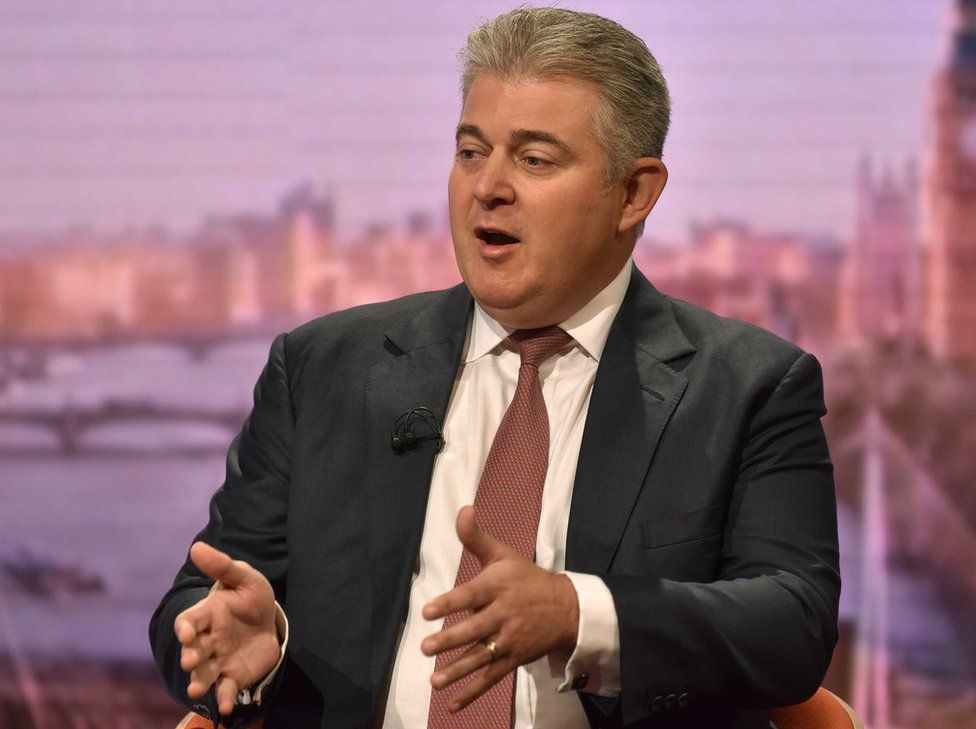Troubles pension: Stormont 'must not play games'
- Published

Stormont's Finance Department must not "play games" over the funding of a pension scheme for Troubles' victims, the NI secretary has said.
Stormont and Westminster have been involved in a long-running row about how payments should be funded.
Executive ministers argue that as the scheme was passed by Westminster, it should produce the funding.
But Brandon Lewis warned against called "red herrings", insisting it had to come from Stormont's block grant.
The block grant is the amount of money given to the executive by the Treasury each year.
Speaking in the House of Commons on Wednesday, Mr Lewis said: "We must make sure progress is not diverted - this is a devolved matter and devolved matters are funded by the block grant.
"The Department of Finance and NI Executive also needs to step forward and get the Independent Fiscal Council (IFC) organised to provide advice and the scrutiny and to help them on these kinds of budgetary matters."
He said there was a "moral and ethical duty" to ensure victims could access the scheme as quickly as possible.
"The Department of Finance need to ensure they do not play games with victims and their pensions and ensure money is made available to the Department of Justice to get on with delivering the programme," he added.
Stormont Justice Minister Naomi Long said Mr Lewis's comment was "disappointing and disingenuous".
Allow Twitter content?
This article contains content provided by Twitter. We ask for your permission before anything is loaded, as they may be using cookies and other technologies. You may want to read Twitter’s cookie policy, external and privacy policy, external before accepting. To view this content choose ‘accept and continue’.
What is the Troubles pension?
The Victims' Payment Scheme was set up to offer money to people who were badly injured during the Troubles, with payments of between £2,000 and £10,000 a year for the rest of their lives.
Upon their death a spouse or carer will get the payments for a further 10 years.
The scheme is a recognition that criminal injuries awards from decades ago were largely inadequate.
Applications for the process are expected to open in March and the scheme has previously been estimated to cost up to £800m.
Speaking later on Wednesday in the House of Lords, Ulster Unionist peer Lord Empey described the stalemate as "intolerable".
He said the UK government had a responsibility to ensure the pension was paid on time to victims.
Other Northern Ireland peers - Lord Dodds of the DUP and Baroness Ritchie of the SDLP - also raised their concerns about the delay in resolving the funding dispute.
Speaking on BBC Radio Foyle's News At One programme, Baroness O'Loan - a former Police Ombudsman for NI - accused the UK government of a "dereliction of duty".
"This is not a huge ask for the UK government in terms of the national economy but it is a burden the NI budget cannot meet," she said.
"A solution is really required now, and that solution must be that the British government accepts that it is responsible for paying these payments."
The scheme has been delayed by the row about how it should be funded, prompting criticism and legal actions from Troubles victims and their representatives.
On Tuesday the victims' group the Wave Trauma Centre said it was "outraged" by the dispute between Stormont and Westminster.
Alan McBride from the group said victims had been treated "disgracefully" due to a "long, long road of delay and deny" by politicians.
Last year a judge ruled that Stormont's Executive Office was acting unlawfully in delaying the introduction of the scheme.
The judge said it was deliberately stymieing the commencement of payouts in order to pressurise the government into funding it.
The ruling came after legal challenges by two victims - Jennifer McNern, who lost both legs in an IRA bomb attack in 1972; and Brian Turley, one of the so-called Hooded Men detained and subjected to special interrogation methods by the British military in the 1970s.
- Published19 January 2021
- Published25 August 2020
- Published21 August 2020